Economy of Uzbekistan is growing, but there are also risks - IMF
Local
−
03 October 2024 8842 3 minutes
The International Monetary Fund (IMF) has forecast a decrease in the ratio of state budget revenues to GDP in Uzbekistan, attributing this to tax incentives. This observation was made in the preliminary report following the IMF mission led by Yasser Abdikh, which visited Uzbekistan from September 16-24.
According to the IMF mission, Uzbekistan's economic indicators remain strong. While the outlook is positive, there are both risks and opportunities ahead. Ensuring macro-financial stability and continuing structural reforms are crucial for sustaining robust growth, rebuilding buffers, and protecting against external shocks.
Economic Growth Continues
In the first half of 2024, the real GDP growth rate reached 6.4 percent. Following an increase in energy prices in early May, the headline consumer price index (CPI) inflation accelerated from an annualized rate of 8 percent at the end of April to around 10.5 percent in recent months. Meanwhile, core CPI inflation remained relatively stable, rising by about one percentage point year-on-year to 7 percent from June to August.
Outlook Remains Positive: Risks and Opportunities
The IMF projects that real GDP growth will remain strong, exceeding 5.5 percent in 2024 and 2025, supported by sustained investment and ongoing structural reforms. Consumer price index inflation is expected to gradually decline due to the diminishing effects of tight monetary and fiscal policies as well as growth in energy resource prices. The current account deficit is projected to narrow to approximately 6.25 percent of GDP in 2024 and 6.1 percent in 2025, bolstered by stronger exports and remittances, a temporary increase in imported machinery and equipment, and budget consolidation.
However, there are downside risks, including regional geoeconomic issues, volatility in commodity prices, an unexpected global economic slowdown, and potential liabilities arising from state-owned enterprises and public-private partnerships. Conversely, an increase in financial flows and remittances, along with rising gold prices, could create new opportunities.
The IMF commended the ongoing efforts of the Uzbek government to maintain macro-financial stability and build reserves necessary for effective economic policy.
The potential impact of a second wave of energy tariff increases in May 2024, coupled with uncertainties regarding wage increases in September-October 2024, poses risks of heightened inflation. In light of this, the IMF recommended maintaining a tight monetary policy until the inflation target is achieved. If inflation exceeds expectations, the Central Bank should be prepared to raise interest rates.
Additionally, the IMF mission acknowledged the ongoing privatization of two major state banks—Sanoatkurilishbank and Asakabank—and recommended leveling the competitive playing field between private and state enterprises.
Live
All




